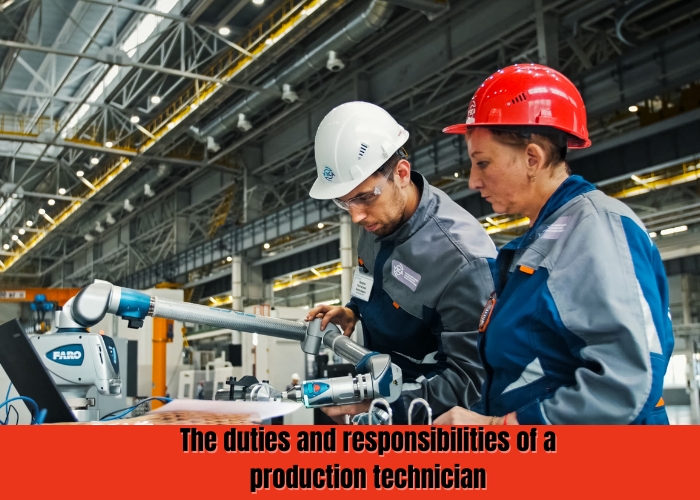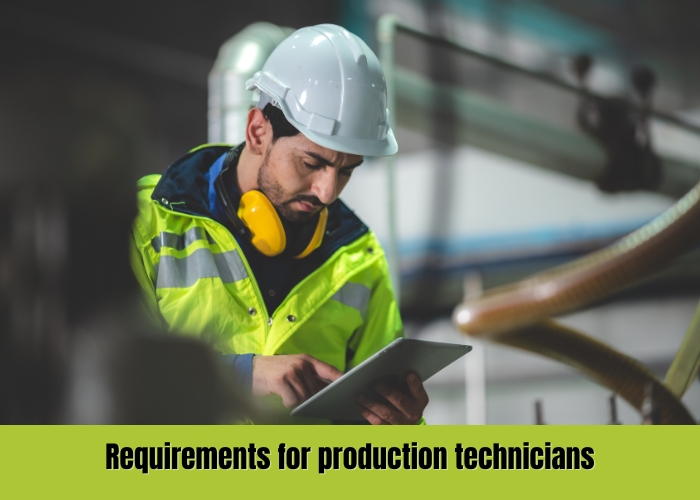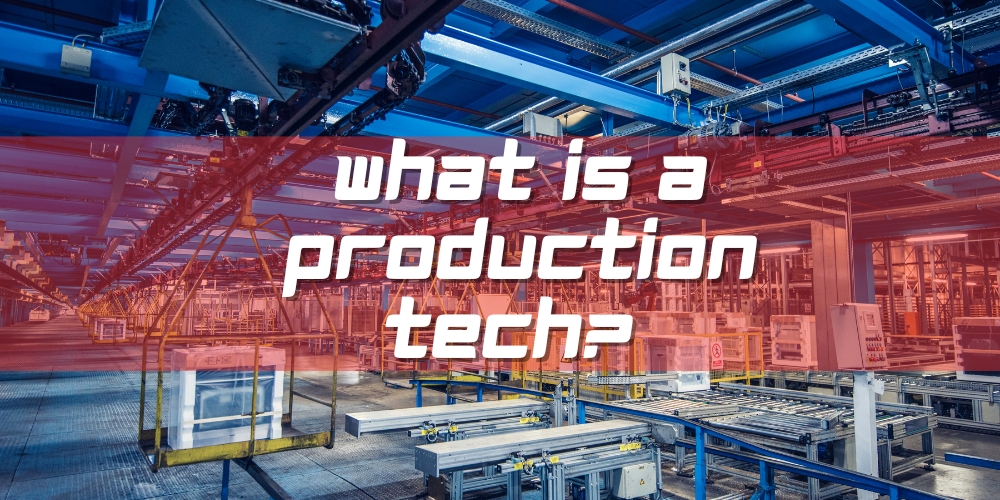Often called a “production tech,” a production technician is a highly qualified individual who works in manufacturing or industrial environments. Their primary responsibility is to support the production process through the maintenance, upkeep, and operation of machines and by upholding safety regulations and guaranteeing product quality. Let’s talk about what production tech is!
A production technician: what is it?
What a production tech is- Production technicians assemble and test manufactured goods before being offered and sold to customers. They ensure that items are defect-free and function as intended by testing and inspecting them. Production technicians frequently operate in factories as members of more prominent teams in conjunction with the quality assurance department to ensure that the manufactured goods are appropriately tested. They also protect the factory’s safety during the workday by adhering to crucial safety guidelines.
What work does a technician in production do?
Production technicians typically work in manufacturing or production environments, preparing, operating, and repairing equipment. They maintain and repair equipment regularly to keep it in good operating order. In addition, they conduct quality control inspections on finished goods and raw materials to ensure they adhere to set standards. They are responsible for making sure the workplace is kept safe and hygienic. They own production logs and other paperwork that are up to date.
Job tasks of a production technician
Throughout the workday, production specialists do several tasks, including:
- ensuring the availability of materials for manufacture in production
- examining and evaluating completed goods
- determining issues with manufacturing or production
- Using quality assurance to communicate solutions for manufacturing difficulties
- teaching colleagues about health and safety laws
- Putting preventative maintenance procedures in place
- examining equipment and instruments to report issues or broken parts
- Setting up staff and coworker training sessions
The duties and responsibilities of a production technician

These fundamental tasks and responsibilities of a Production Technician were determined by examining multiple job advertisements.
Create and Examine Assemblies
To satisfy all efficiency, quality, and safety requirements, technicians carry out minor preventive maintenance duties as well as setup, operation, and equipment modifications. Before putting any assemblies or equipment into production, they test it for productivity and safety.
Point Out Issues and Make Improvement Suggestions
Production technicians must identify potential solutions and use their technical skills to troubleshoot issues during assembly and equipment testing. Potential difficulties may include mechanical mistakes, safety concerns, or detected inefficiencies.
Examine and evaluate completed goods.
Production technicians are in charge of upholding quality standards by testing and examining completed goods to make sure they meet requirements and regulations. They carry out this action before the start of full-scale production and occasionally afterward.
Skills of a Production Technician
An effective Production Technician is an analytical thinker and problem solver. They are passionate about delivering trustworthy, high-quality work and have extraordinary attention to detail. Employers are looking for applicants with the following skills as production technicians: these general skills and personality attributes.
Core competencies:
- According to the job postings we looked at, employers are looking for Production Technicians with these competencies.
- Pay close attention to the following if you wish to become a production technician.
- Strong motor abilities and the capacity for precise assembly
- The capacity to detect flaws and recognize and differentiate between colours
- Experience working in a pilot or start-up production setting. Excellent communication skills in both written and spoken English
- Ability to attentively study and adhere to instructions with excellent detail-orientedness and organization.
Advanced abilities:
- The following abilities were recommended in several job listings, even though most companies did not require them.
- Expand your employment choices by including these in your toolkit as a Production Technician.
- An ACT at WorkKeys Silver Level Certificate of National Career Readiness (NCRC)
- Experience with forklifts
- knowledgeable about shipping paperwork, such as packing slips and bills of lading
- fundamental knowledge of computers
Workplace for production technicians
Production technicians may work in various environments depending on their area of employment and particular job responsibilities. However, many production technicians are employed by factories or manufacturing firms, where they assemble products on the factory floor. They may be expected to move swiftly, stand for extended periods, and lift large objects when needed in these typical conditions.
Production technicians may operate many tools and machines to build products in other factory environments while seated. Even though there may be less chance of harm in these environments, it can still be crucial for them to pay care when using their tools and recognize when they might need to be repaired.
Requirements for production technicians

The following are the primary prerequisites for beginning a career as a production technician:
Training:
Production technicians may need different training based on the industry or type of employment they want to pursue. Many people merely require a high school degree or the equivalent of a GED to apply for jobs in low-tech manufacturing facilities to apply for employment in low-tech manufacturing facilities. However, enrolling in a vocational program may open up additional job prospects for those wishing to work in high-tech manufacturing. A production technician’s vocational training frequently equips candidates with a robust technical skill set, such as computer and electrical comprehension, to assist them in getting ready for the field and stand out to employers.
Education:
Many low- to mid-tech manufacturing companies offer outstanding on-the-job training to assist production technicians in carrying out their many responsibilities. A production technician may be required to employ mathematical skills and be proficient with various production software programs, even though most training requires manual labor and active listening abilities. Specific organizations might offer more practical training to certain organizations to assist production technicians in learning how to carry out these responsibilities. Other facilities, too, might search for people with prior training or expertise in these fields.
Accreditations
The Certified Production Technician (CPT) credential is the most widely held certification for production technicians. The qualification, which teaches people a remarkable understanding of the manufacturing process and how to monitor production quality, is offered by the Manufacturing Skills Standards Council (MSSC). The certification provides advantageous credentials to anyone looking for work as a manager or supervisor and assists persons in positioning themselves for progress. The exam consists of 80–101 questions, and before taking it, candidates should at least be proficient in arithmetic and reading from the ninth and tenth grades, according to the MSSC.
Conclusion:
What a production tech is- Maintaining the effectiveness and caliber of manufacturing processes requires the presence of production technicians. They call for a blend of technical proficiency, meticulousness, and the capacity to function successfully in a group setting. Technical education, on-the-job training, and occasionally certification in particular industry-related fields are common forms of training for this position.

